- Infographics:
- Factors preventing investment
- |
- Energy matrix
- |
- Energy efficiency
- |
- Asset finance
- |
- Renewable investment
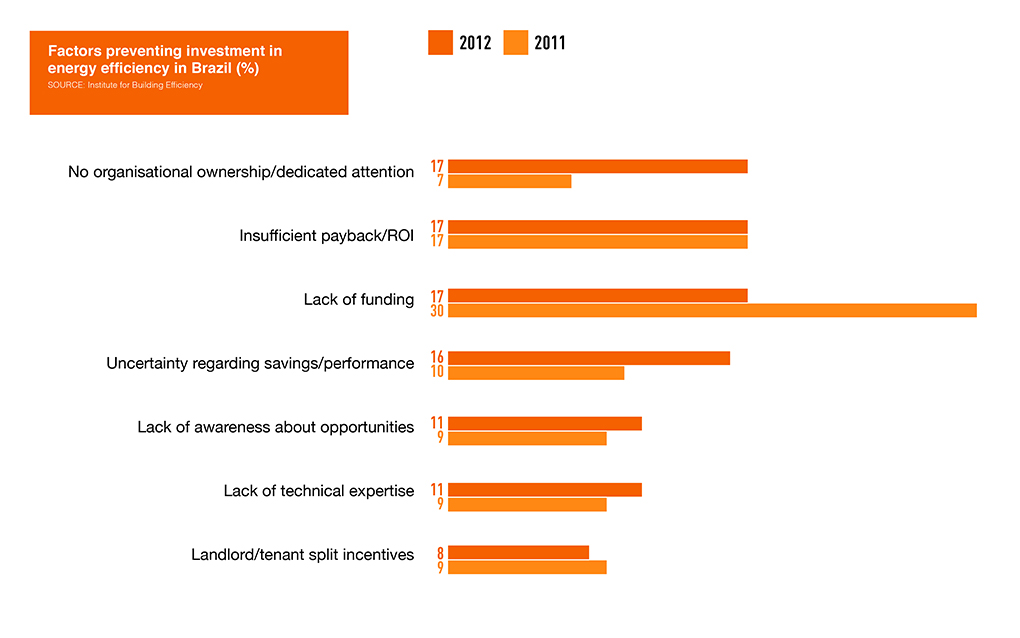
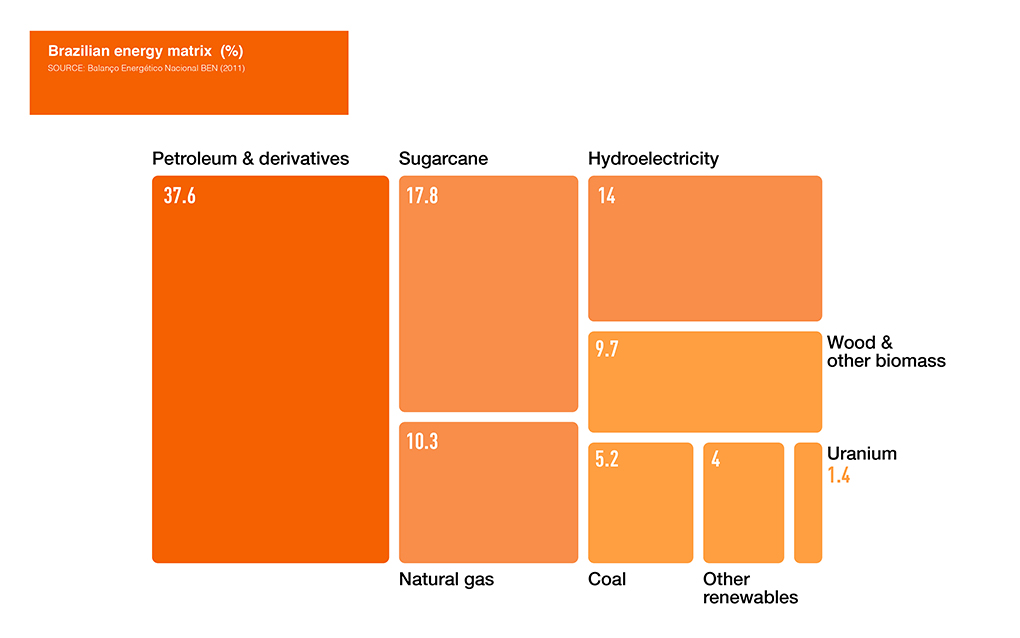
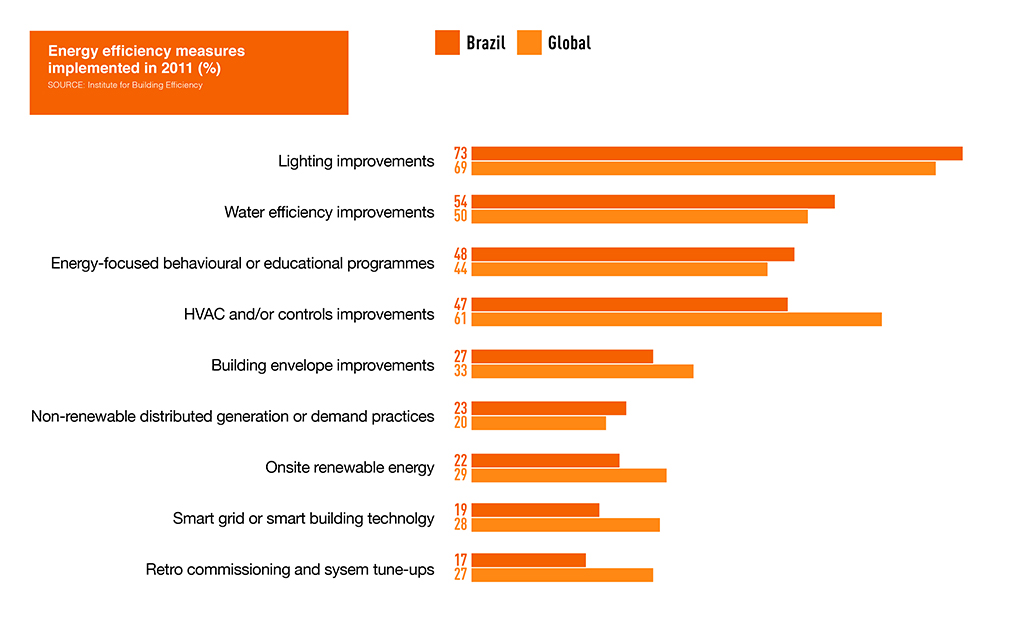
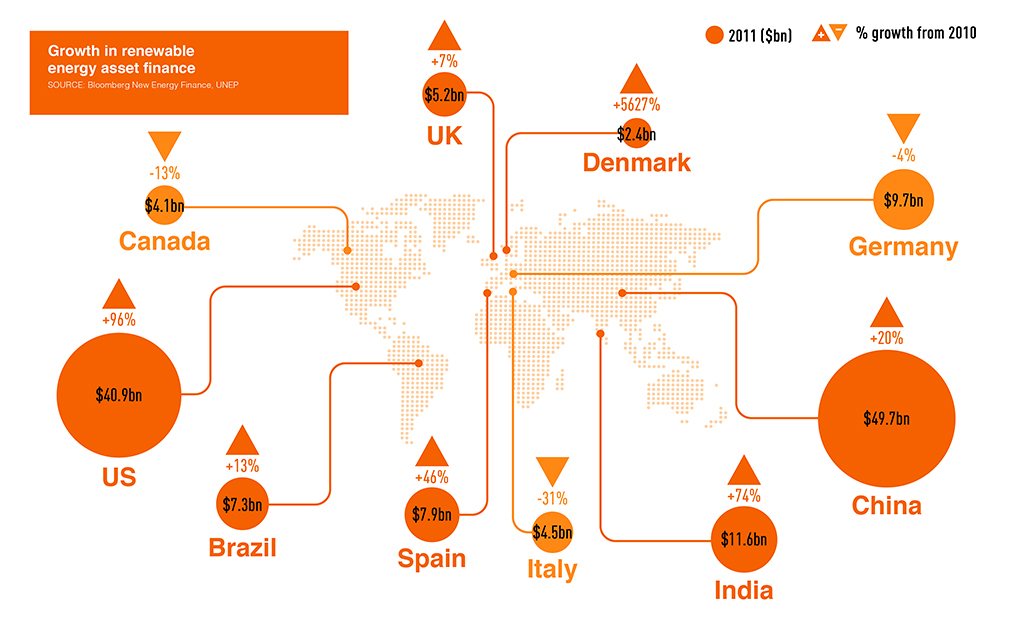
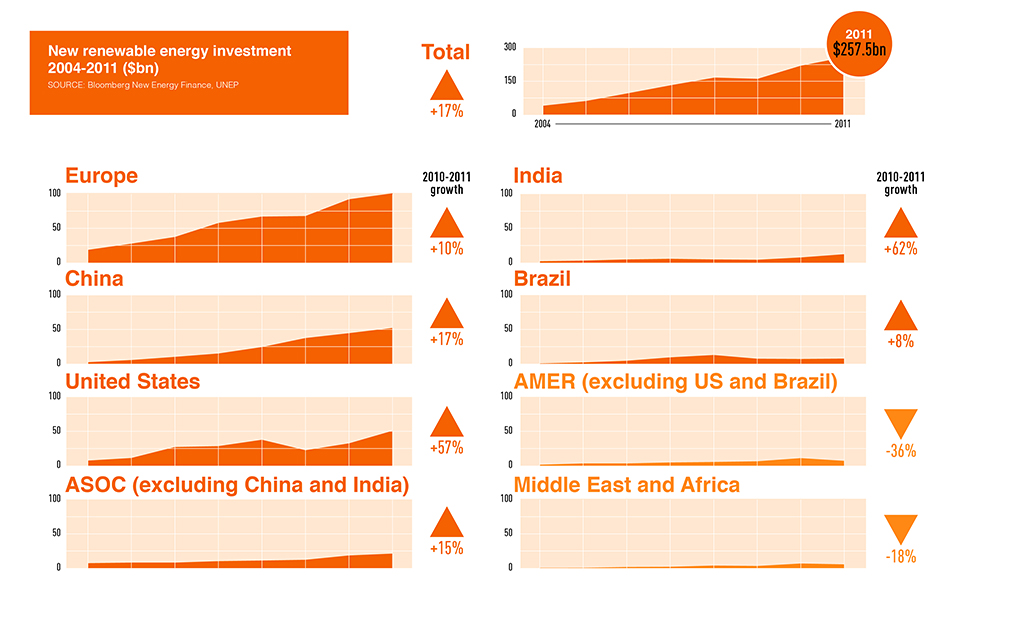
Despite being the world’s tenth largest consumer of energy, Brazil is an example as to what can be achieved with clean, renewable energy sources on a global scale; it is a world leader in pioneering new biofuel technologies.
Brazilian energy supplier Neoenergia was founded in 1997 and made its first investment in generation in 1999. It started significant expansion in 2000, and since then has grown to become one of the leading suppliers of electrical energy in Brazil.
Renewable energy in Brazil is a world-leading example of what can be achieved in the sector at a practical level. Today, ethanol derived from sugar cane is an important source of energy in Brazil for running vehicles – usually vehicles that can use both petrol and ethanol. The nation is proud to have the world’s first sustainable biofuels economy.
The success of renewable energy in Brazil can be attributed in large part to historical factors. In the 1970s, shocks to the world’s oil supply led Brazil to start initiatives to explore the use of sugarcane-derived ethanol for running vehicles.
Because of the large number of waterways that criss-cross the country, the fundamental energy model of Brazil had long been based around hydroelectric power. This is still the case today. However, at the start of this century, a period of scarce rainfall obliged the Brazilian government to bring in emergency power rationing.
The dry spell forced the authorities to acknowledge that their country’s historical dependence on hydroelectricity was no longer viable in a nation with economic ambitions and social demands. The government began encouraging energy conservation, the exploration of non-conventional energy sources, and the creation of small hydroelectric power plants and other sources of renewable energy in Brazil.
Today, Brazil is the largest consumer of energy in South America and the 10th largest in the world. Renewable energy in Brazil is boosted by the country’s ethanol outputs – of which it is the second largest producer in the world.
Neoenergia places its emphasis on renewable energy in Brazil. Many countries around the world are in the process of assigning funds to renewable energies: attempting to make the most of the resources they have. In many instances, countries are still grappling with how to move away from their reliance on fossil fuels.
There is a passion and concerted commitment to further implementing renewable energy in Brazil. The nation has the know-how, the investment, the technical knowledge and the support of principal energy suppliers. It has all the key factors to turn its commitment into reality.
What is clear is that the world needs to follow the example set for renewable energy in Brazil. Global reserves of coal are sufficient to last for 200 or 300 years – and very likely for longer – but oil and gas supplies are likely to require rationing by around 2040 unless sufficient new supplies can be found.
The Neoenergia Group plays a vital role in renewable energy in Brazil. It is committed to advancing two causes fundamental to the well being of Brazil’s people: now and in the future.
Firstly, the company is committed to the generation of energies such as hydroelectric and wind power, in addition to the development of other types of renewables. Today, clean energy initiatives in general, and renewable energy initiatives in particular, are an essential part of the future of energy in Brazil.
Secondly, Neoenergia’s business practices and practical contributions to the well being of the Brazilian people exhibit high standards of social responsibility. Authorities and the public have long been committed to supporting clean and renewable energy in Brazil, but never so much as now – and Neoenergia is leading the way.
Renewable energy in Brazil is subject to inspection by four major government agencies responsible for formulating and implementing the nation’s energy policy: the Ministry of Mines and Energy (MME); the National Agency for Electrical Energy (ANEEL); the National Agency of Petroleum, Natural Gas and Biofuels (ANP); and the National Council for Energy Policy (CNPE).
The MME was founded in 1960 and promotes investments in the mining and energy industries. It also channels funds to relevant research while establishing and promulgating Brazilian government energy policy. The ANP works with the MME and is the federal government agency of Brazil that has responsibility for regulating a number of fuels.
The CNPE came into being as a result of Brazil’s ‘Petroleum Investment Law’. The CNPE has the responsibility of providing advice to the Brazilian presidency in matters associated with the country’s electricity policy.
In the last decade of the 20th century, and the first decade of 21st, extensive market liberalisation was applied to the Brazilian energy sector. The 1997 Petroleum Investment Law had a revolutionary effect on the markets. A new legal and regulatory framework was created for the sector, and the CNPE and the ANP were created.
The law also brought in new measures to encourage investment in the energy market, other measures to increase competition in Brazil’s energy markets, and fostered the increased utilisation of natural gas. Further reforms in 2003 and 2004 brought three new institutions into being.
These new institutions were: Empresa de Pesquisa Energetica, which was given responsibility for long-term electricity-sector planning; the Committee of Monitoring of the Electric Sector, which was made responsible for electric energy supply safety; and the Chamber of Commercialisation of Electric Energy, which would be involved with commercial issues relating to supplying electricity over the network.
New initiatives were also introduced regarding how energy contracts could be bought and sold. Altogether, these new regulatory developments were geared to achieving three primary objectives:
What are Brazil’s major sources of energy? Figures covering the totality of Brazilian power consumption in 2011 show a wide variety of sources contribute to the nation’s powerhouse:
The activities of the Neoenergia Group cover 12 states in Brazil, and the consortium has invested about R$20.4bn through all its activities. Today, Neoenergia is the second-largest private generator of electricity in Brazil, and the Brazilian electricity sector’s largest private group organisation by number of clients. Neoenergia is one of the biggest private investors in the electricity sector and a forerunner in renewable energy in Brazil.
Neoenergia operates in every area of the electricity sector, including generation, transmission, distribution and sales. It performs a fundamental role in Brazil’s development, and any analysis of Neoenergia’s work in the nation makes good this claim.
Neoenergia pursues a policy of implementing a wide range of socially and environmentally responsible business models that are founded on the relationships the Neoenergia Group has with its different publics.
The group defines its corporate processes and overall organisational objectives so as to make social and environmental planning central to its overall activities, culture and way of doing business.
Furthermore, the group supports this attitude with significant investment. Over the past five years, for example, Neoenergia has invested many hundreds of millions of real in specific initiatives in its programme of social and environmental projects. The group provides power to about 30 million people in the Brazilian states of Bahia, Pernambuco and Rio Grande do Norte.
The Neoenergia Group has many success stories from its commitment to in renewable energy in Brazil. As a matter of policy, the company pursues a continual programme of increasing its investments in renewable energy and clean energy programmes. Examples include:
The company is also heavily involved with the construction of Dardanelos Hydropower Plant, on the Aripuana river, in the State of Mato Grosso. This project is organised by Energetica Aguas da Pedra (EAPSA), 51 percent of which is owned by Neoenergia.
EAPSA has received authorisation from ANEEL to start the plant’s commercial operation. This plant is capable of generating 261 megawatts. The Dardanelos Hydropower Plant has been designed to have a particularly low impact on the environment
Neoenergia’s electric power distributing companies – Coelba in Bahia, Celpe in Pernambucco and Cosern in Rio Grande do Norte – have successfully replaced 170,000 refrigerators under Brazil’s Energy Efficiency Programme. This programme is known as Nova Geladeira (‘new refrigerator’) and is designed to replace old domestic appliances with new models that consume lower levels of energy.
This initiative is particularly aimed at low-income customers and has the obvious benefit of reducing energy bills. It is an important step towards the increased use of renewable energy in Brazil.
A partnership between Neoenergia distributors Coelba, Celpe and Cosern with the Ayrton Senna Institute – named after the hugely popular racing car driver who tragically lost his life – has led to sponsorship of the Educacao pela Are project. This is an exciting and important educational programme in the states of Bahia, Pernambuco and Rio Grande do Norte, intended to provide gratis education to children and teenagers from low-income families.
Neoenergia strongly supports, through practical means, the principle of culture being a vital catalyst for social improvement and for enjoyment. It is sponsoring a wide range of cultural activities and projects in Brazil through its subsidiaries responsible for energy distribution and generation. These activities and projects include those connected with the cinema, theatre, dance, literature, music and a range of other cultural pursuits.
The National Programme for the Universalisation of Access and Use of Electric Energy is a Brazilian Federal Government project to which the Neoenergia Group provides comprehensive support. The project’s aim is to make electricity available in even the remotest areas of the rural environment, thereby enabling remote communities to use it as a spur to social and economic progress.